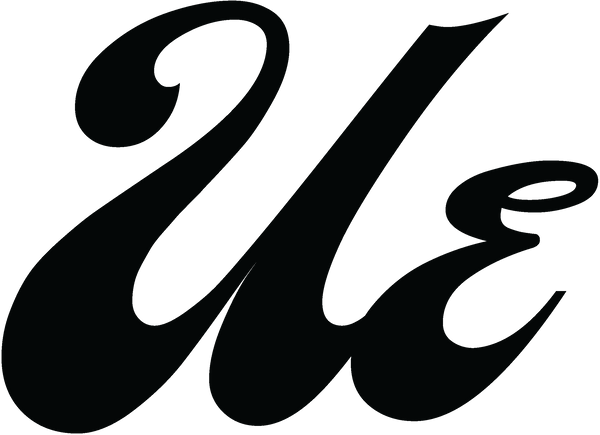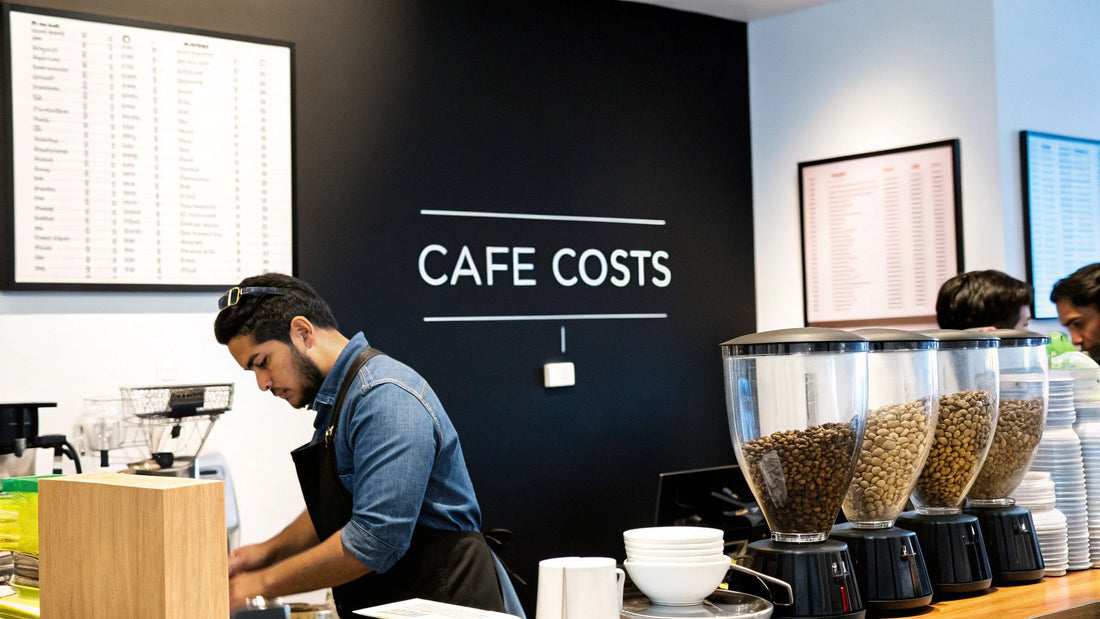
How Much Does It Cost to Open a UK Speciality Coffee Shop?
Share
So, you're dreaming of opening your own speciality coffee shop in the UK. It’s an exciting thought, but before you start picking out quirky mugs, let's talk numbers. The big question on every aspiring cafe owner's mind is: how much does it actually cost?
In the UK, you could be looking at anywhere from £25,000 for a small, lean setup to well over £150,000 for a high-spec spot in a prime city-centre location. Your final figure really hinges on your vision, where you set up shop, and how ambitious your fit-out is.
Your Cafe Dream vs. The Financial Reality
Every great coffee shop starts with two things: a genuine passion for amazing coffee and a rock-solid financial plan. The smell of freshly ground beans and the buzz of happy customers is the goal, but a deep understanding of the costs is what gets you there. There's no single magic number; it’s all about building a realistic budget that fits your specific dream.
Getting this right from the start involves some serious thought and strategic decisions. Making that dream a reality means mastering crucial financial planning for business owners, especially when it comes to things like cash flow and VAT.
Breaking Down the Initial Investment
Your total startup cost is a patchwork of different expenses, and each one can vary wildly. That £25,000 to £150,000 range covers everything from securing your lease and handling the interior refit to buying equipment, sorting technology, and getting your first big stock order in.
The main things that will move the needle on your budget are:
- Location: This is a big one. Rent for a spot in a bustling London district is going to be worlds apart from a lease in a quiet Cotswold town.
- Size and Condition: A bigger space obviously costs more, but so does one that needs a complete gut-and-rebuild. A lick of paint is one thing; rewiring and replumbing is another.
- Equipment Choices: Are you going for a brand-new, top-of-the-line Italian espresso machine, or are you happy with a reliable second-hand machine? Leasing is also an option. This choice alone can create a huge price difference.
- Your Concept: A simple coffee and cake counter needs far less kitchen gear than a full-blown brunch spot with a complex menu.
To give you a clearer picture, here’s a rough breakdown of what you might expect.
UK Cafe Startup Costs At a Glance
The table below offers a snapshot of potential startup costs, comparing a more budget-friendly setup, perhaps in a smaller town, with a high-end venture in a competitive city like London.
| Expense Category | Low-End Estimate (e.g., Small Town) | High-End Estimate (e.g., London) |
|---|---|---|
| Lease Deposit & Rent | £3,000 - £6,000 | £15,000 - £30,000+ |
| Fit-Out & Renovation | £5,000 - £20,000 | £40,000 - £80,000+ |
| Coffee Equipment | £8,000 - £15,000 | £25,000 - £50,000 |
| Furniture & Fixtures | £2,000 - £5,000 | £10,000 - £25,000 |
| Licences & Legal Fees | £1,500 - £3,000 | £3,000 - £8,000 |
| Initial Stock | £2,000 - £4,000 | £5,000 - £10,000 |
| POS & Technology | £1,000 - £2,500 | £3,000 - £7,000 |
| Marketing & Signage | £1,500 - £3,000 | £6,000 - £12,000 |
| Contingency Fund (15%) | ~£3,675 | ~£16,050 |
| TOTAL ESTIMATE | ~£28,175 | ~£123,050+ |
Remember, these are just estimates. Your final costs will depend entirely on your specific choices and circumstances.
Planning for the Unexpected
One of the most common mistakes I see new entrepreneurs make is underestimating just how much things will cost. It's easy to budget for the big, obvious expenses like rent and your espresso machine, but people often forget the hidden fees, initial marketing spend, and the cost of unforeseen delays.
My best piece of advice? Add a contingency fund of at least 15-20% on top of whatever you calculate your budget to be. Think of this as more than just a safety net—it’s a strategic tool that gives you the breathing room to handle surprises without having to compromise on your vision.
Securing Your Location: The Biggest Investment
Your café's location is so much more than an address on a map. It's the heartbeat of your business and, without a doubt, the single biggest line item in your startup budget. The choice you make here will echo through every part of your operation, from footfall and brand identity to your long-term profitability. This decision is where a massive chunk of the answer to "how much does it cost to open a café?" really lies.
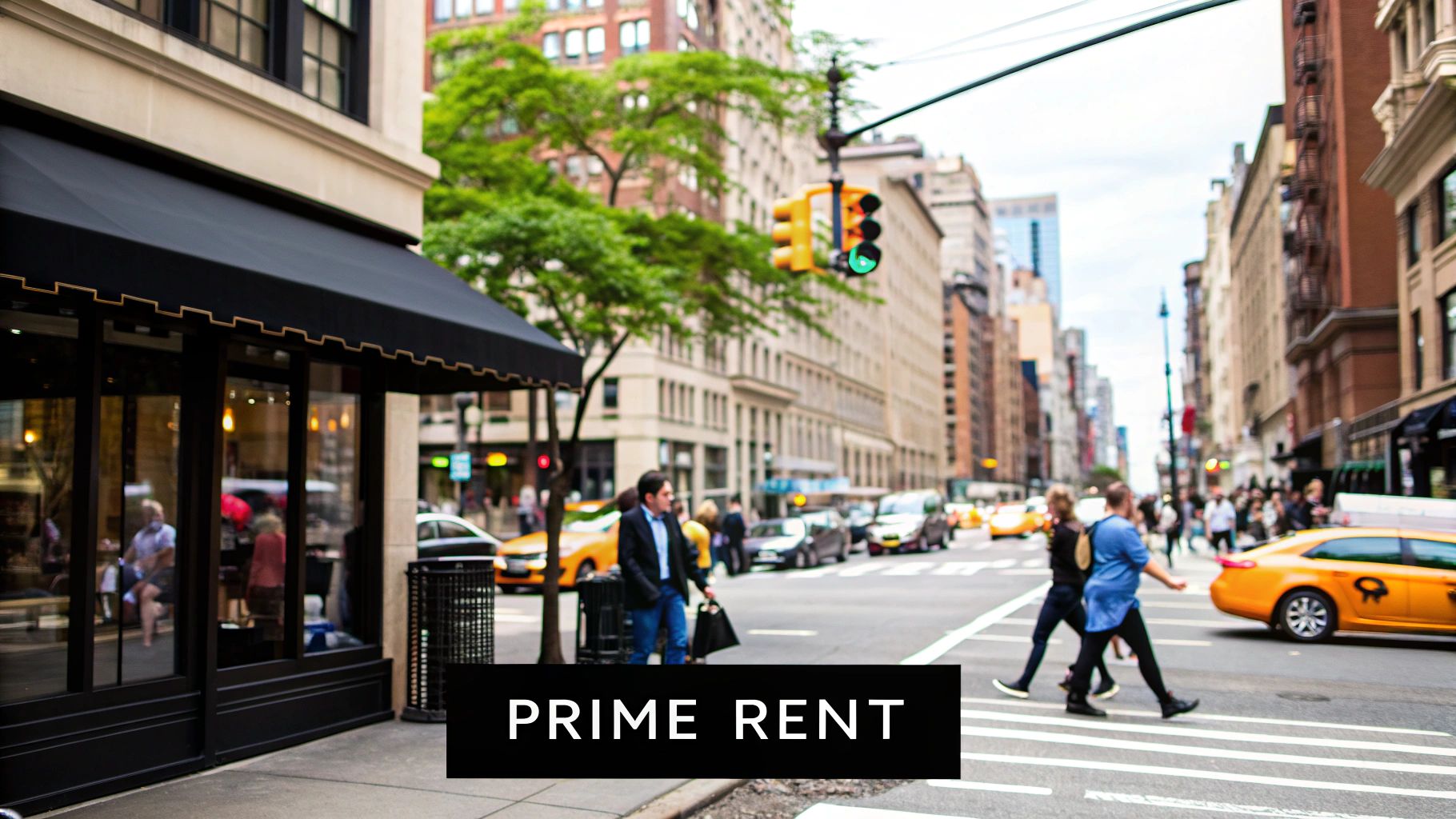
Before you even start dreaming about espresso machines or colour palettes, you need to tackle the fundamental choice of securing a physical space. Let’s be realistic—the UK commercial property market is a beast, and you’ll need a strategic and well-funded approach.
To Lease or To Buy: A Critical Decision
For almost every new café owner, leasing is the only viable path forward. Buying a commercial property requires an immense amount of upfront capital that most startups simply don’t have. Leasing, while still a huge investment, makes launching your dream accessible without needing hundreds of thousands of pounds for a deposit.
But leasing comes with its own set of financial hurdles. You're not just paying the first month's rent. Landlords will typically require a substantial deposit—often equal to three to six months' rent—to secure the lease. For a prime location, this deposit alone can easily be a five-figure sum.
Let's break it down:
- Leasing: A much lower initial capital hit, but you're bound by the landlord's terms and face regular rent reviews. The big plus? It offers flexibility if you decide to relocate or expand down the line.
- Buying: A huge upfront cost, but you own the asset and build equity. You have complete control over the property, but you're also on the hook for all maintenance and repairs.
For a new speciality coffee venture, the flexibility and smaller initial outlay of leasing make it the logical choice.
Understanding Commercial Lease Costs
That headline rent figure you see on a listing? It’s just the beginning. Commercial leases in the UK are complex documents, often filled with clauses that have serious financial implications. You absolutely have to budget for professional fees right from the start.
Engaging a solicitor who specialises in commercial property is non-negotiable. They will scrutinise the lease for hidden pitfalls like aggressive rent review clauses, full repairing and insuring (FRI) liabilities (where you pay for all building repairs), and service charges. These fees can range from £1,500 to £5,000 or more, but trust me, this investment can save you from disastrous financial commitments later.
A savvy negotiation tactic is to request a rent-free period. This is a set number of months at the start of your lease where you don't pay rent, giving you vital breathing room to complete your fit-out before you have to start generating income.
High Street vs. Hidden Gem: Location Scenarios
The location itself dictates the price tag. A high-footfall spot in a city centre like Manchester or Bristol offers a constant stream of potential customers but comes with premium rent. On the flip side, a suburban unit nestled in a residential community will be cheaper but will require a lot more marketing effort to become a destination.
Let’s look at two practical scenarios:
- The City Centre Hotspot: You find a 70-square-metre former retail unit on a busy shopping street. The rent is £40,000 per year (£3,333/month). Your initial outlay would be a deposit of £10,000 (3 months) plus the first month's rent, totalling £13,333 before you even get the keys.
- The Suburban Community Hub: You find a similar-sized space on a local neighbourhood parade. The rent is £18,000 per year (£1,500/month). Your initial outlay would be a deposit of £4,500 plus the first month's rent, totalling £6,000.
This stark difference shows just how much your location choice drives your initial property costs. According to industry research, startup costs for independent hospitality businesses in prime UK locations can soar, driven largely by real estate prices, the scale of the fit-out, and staffing needs. You can discover more insights about UK restaurant startup costs and how location plays a key role.
Ultimately, your choice must align with your brand, your target audience, and most importantly, your budget. Securing your location is the first major milestone, and getting it right sets the financial foundation for everything that follows.
Crafting Your Space: Fit-Out and Equipment Costs
This is where the magic happens. Transforming an empty shell into a vibrant speciality coffee shop is where your brand’s personality finally comes to life. All those abstract ideas about atmosphere and workflow suddenly become real, tangible things. But let's be honest—it's also where a huge chunk of your budget gets spent. Getting a firm grip on fit-out and equipment costs is essential to figuring out the real answer to "how much does it cost to open a cafe?"
The fit-out is all about turning a commercial space into a functional, safe, and inviting café. This goes way beyond just painting the walls and picking out some nice chairs. It’s the deep, foundational work that makes a modern coffee shop tick.
The Anatomy of a Cafe Fit-Out
Before you can even dream of installing that beautiful espresso machine, the space itself needs some serious prep work. For a speciality coffee shop, this almost always means significant plumbing and electrical upgrades. You'll need dedicated water lines for your coffee machine, ice maker, and sinks, plus a drainage system that can handle the constant flow.
Then there’s the power. Commercial coffee equipment is thirsty for electricity. A standard three-group espresso machine and a couple of grinders can easily demand a 32-amp supply, which is far more than typical domestic wiring can handle. This often means bringing in specialist electricians to upgrade the building’s consumer unit, a job that can easily run into the thousands.
Beyond those big-ticket essentials, your fit-out budget needs to cover:
- Flooring: You'll need commercial-grade, non-slip flooring for safety, especially behind the bar. This could be anything from durable vinyl to polished concrete, and the costs vary massively.
- Lighting: Good lighting is everything for creating the right atmosphere. You'll want a mix of ambient lighting for the seating area and focused task lighting over the bar so your baristas can see what they're doing.
- The Service Counter: This is the heart of your café. A custom-built counter, designed specifically for your workflow, can cost anywhere from £4,000 to £15,000, depending on the materials and how complex the design is.
- General Construction: This is the catch-all for everything else. Think building partition walls for a small kitchen or storage area, plastering, painting, and all the decorating that brings your brand’s look and feel to life.
Don’t underestimate the ‘unseen’ costs. Most of your fit-out budget will disappear into things your customers will never even notice, like plumbing, electrics, and ventilation. Getting these fundamentals right isn't just important—it's non-negotiable for a safe and functional business.
The Heart of Your Operation: Coffee Equipment
Once the space is prepped, it’s time to fill it with the tools of the trade. Your coffee equipment isn't just a collection of machines; it’s the engine that drives your entire business. The quality of your coffee, the speed of your service, and your daily workflow all hinge on getting this right.
This image gives a quick look at how your initial budget might be split between the big-ticket equipment and the furnishings that make the space comfortable.
As you can see, the investment in your core coffee gear often dwarfs what you'll spend on tables and chairs. It’s a serious part of your financial planning.
The espresso machine might be the star of the show, but it’s just one piece of a much larger puzzle. To budget accurately, you need a complete list of everything you'll need from day one.
Essential Cafe Equipment Cost Breakdown
Here’s a realistic look at the gear that will form the backbone of your operation. I’ve broken down the costs for buying new versus finding a good second-hand deal or leasing, which can be a great way to manage cash flow.
| Equipment Item | Estimated New Cost | Estimated Second-Hand/Lease Cost | Key Considerations |
|---|---|---|---|
| 2-Group Espresso Machine | £6,000 - £12,000+ | £150 - £300 per month | This is your main money-maker. Reliability and solid service support are everything. |
| On-Demand Grinders (x2) | £1,500 - £4,000 | £40 - £80 per month | You'll need one for your house espresso and another for decaf or a guest bean. Consistency is key. |
| Batch Brewer | £500 - £2,500 | £20 - £60 per month | Absolutely essential for serving high-quality filter coffee quickly during the morning rush. |
| Water Filtration System | £300 - £800 | N/A (usually purchased outright) | Protects your expensive machines from limescale and ensures your coffee tastes consistently great. |
| Under-Counter Fridge | £400 - £1,500 | £20 - £50 per month | For milk and other chilled items. Position it carefully for the smoothest workflow. |
| Ice Machine | £500 - £2,000 | £25 - £60 per month | A must-have for iced coffees, which are a huge seller, especially in the summer. |
| EPOS System & Till | £800 - £3,000 | £30 - £70 per month (software fee) | The brain of your sales operation. Look for a system with good inventory management features. |
This table covers the essentials, but don't forget the smaller bits and pieces—pitchers, scales, tampers, and crockery all add up!
To Buy New or To Lease?
This is a big strategic decision every new café owner has to make. Buying all your equipment outright is a huge upfront expense, and frankly, it's just not realistic for most startups. You own the assets, but your cash reserves take a massive hit.
That’s where leasing comes in. It breaks the cost down into predictable monthly payments. Yes, you'll pay more in the long run, but it frees up that precious starting capital for other critical things, like your first big stock order or a proper marketing launch.
Plus, many leasing agreements in the UK bundle in regular servicing and maintenance. That can be an absolute lifesaver when a machine inevitably needs a bit of TLC. It’s a classic trade-off: a higher total cost over time versus a much lower initial risk. It’s a balance you’ll have to weigh up carefully for yourself.
Budgeting for Daily Operations and Overheads
The big, one-off investments like your fit-out and espresso machine feel like the biggest hurdles to clear. But the long-term survival of your café truly hinges on mastering the relentless, day-to-day running costs.
Once you open your doors, a whole new set of expenses kicks in. These are the operational costs and overheads that will shape your monthly budget and, ultimately, your profitability.
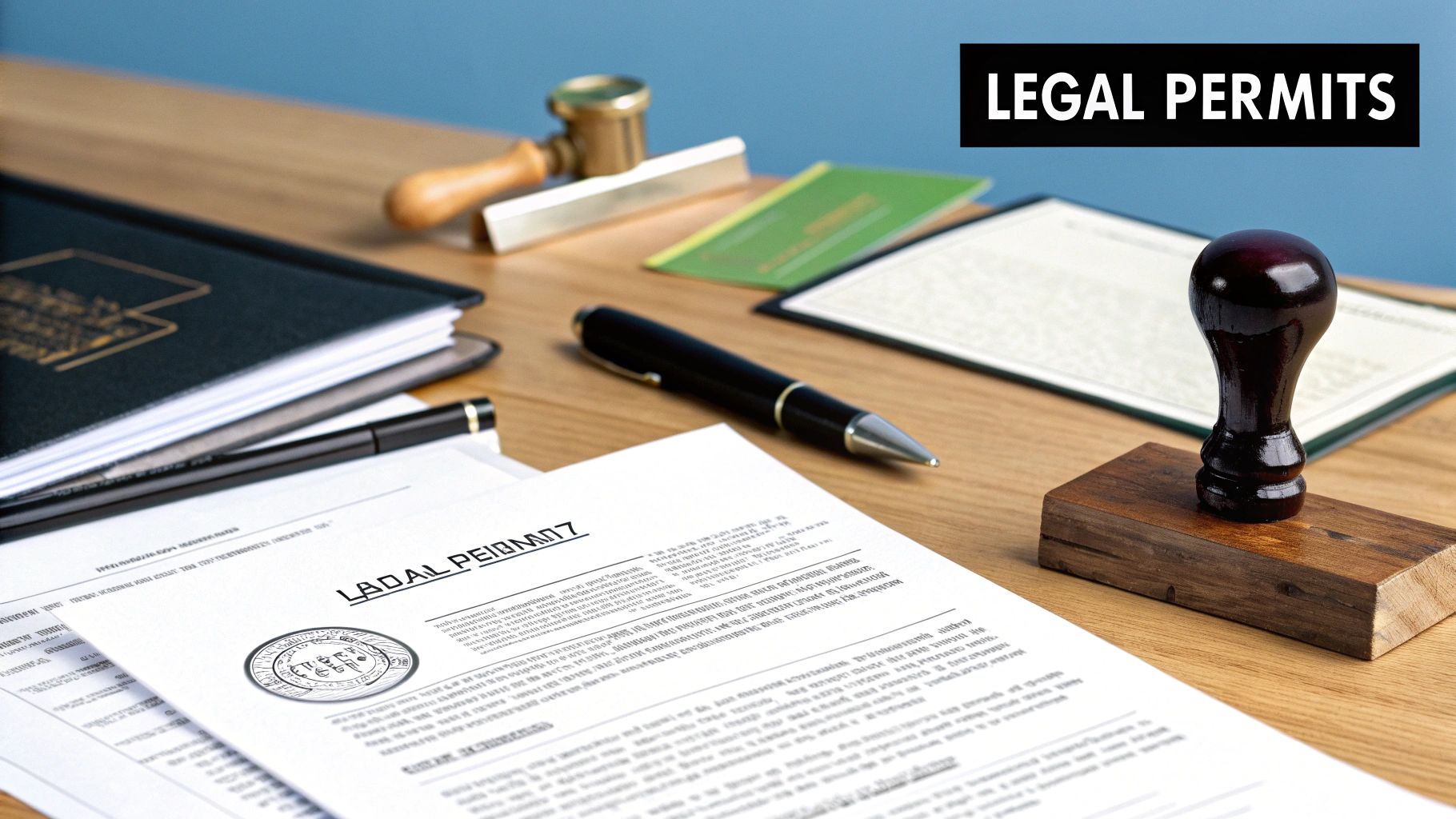
A successful launch is one thing; building a sustainable business is another challenge entirely. This next phase demands a sharp focus on everything from the legal necessities of licences and permits to the constant churn of stock and utilities. Getting these figures right is a core part of answering "how much does it cost to open a café?" beyond the initial setup.
Navigating UK Licences and Permits
Before you can serve that first flat white, you need to be fully compliant with UK regulations. These licences aren't optional, and the costs can add up, so it's essential to factor them into your operational budget from day one.
Here’s a quick checklist of the essentials you’ll likely need:
- Food Business Registration: You must register your premises with your local council at least 28 days before you open. The good news? It's free, but it's a non-negotiable legal requirement.
- Food Hygiene Rating: After you register, an inspector will visit to award you a hygiene rating from 0 to 5. While the inspection itself is free, achieving a top score might require some investment in staff training or equipment upgrades.
- The Music Licence (PPL PRS): Planning to play music to create that perfect ambiance? Whether it's a curated playlist, the radio, or a TV, you legally need a licence from PPL PRS. Costs vary based on your café's size, but expect it to be a few hundred pounds annually.
- Premises Licence: If you’re thinking about serving alcohol—perhaps for an evening menu or some cheeky espresso martinis—you'll need a Premises Licence from your council. This is a more complex and costly process, often running to several hundred pounds in application fees, plus potential legal assistance.
These administrative costs are just an unavoidable part of your monthly and annual overheads.
Budgeting for Your Opening Inventory
Your shelves won't stock themselves. That first big inventory order is a significant cash outlay that happens just before you start bringing any money in. For a speciality coffee shop, this goes far beyond just a few bags of beans.
You'll need to budget for everything required to make and serve every single item on your menu. This includes:
- Speciality Coffee Beans: Your star player. You’ll need a healthy supply of your house espresso, a solid decaf option, and maybe a rotating single-origin for pour-overs.
- Milk and Alternatives: Dairy milk is a staple, but the demand for oat, almond, and soya milk is non-negotiable in today's market. Just remember, these alternatives are often more expensive.
- Pastries and Cakes: Sourcing high-quality baked goods from a great local supplier will be a huge part of your offering.
- Consumables and Packaging: This is a surprisingly large expense. It covers everything from takeaway cups, lids, and sleeves to sugar sachets, stirrers, napkins, and branded paper bags.
A realistic budget for your first major stock order could fall anywhere between £2,000 and £5,000, depending on the scale and ambition of your menu.
Your initial stock is a real balancing act. You need enough to handle a busy opening week without over-ordering and risking waste, especially with fresh items like milk and pastries. My advice? Start lean and track your sales like a hawk.
Managing Relentless Recurring Overheads
Finally, we get to the overheads—the constant, recurring costs of simply keeping the lights on and the business running. Long after the initial setup is complete, these expenses will make up the bulk of your monthly outgoings.
Key overheads to budget for include:
- Business Rates: This is the property tax for commercial premises in the UK. The good news is you may be eligible for small business rate relief, which can significantly reduce this cost.
- Utilities: This covers your electricity, water, and gas. Be prepared: your high-powered coffee equipment will make your electricity bill a substantial monthly expense.
- Insurance: Public liability, employer's liability, and contents insurance are absolutely essential to protect your business, staff, and customers.
- Waste Collection: You'll need to set up a commercial waste contract for your general waste and recycling.
- Software Subscriptions: Don't forget the monthly fees for your EPOS system, accounting software, and any other digital tools you rely on.
When it comes to managing the ongoing costs of your café, efficient expense tracking is non-negotiable. For some great tips, check out this practical guide on how to track business expenses.
These recurring costs can easily reach £2,000 to £5,000+ per month, even for a small café. It really underscores the need for a robust financial plan from day one.
Investing in Your Team and Launch Marketing
An empty café is just a room full of nice furniture. It's your team and your customers that bring it to life, turning it into the buzzing community spot you've been dreaming of.
Budgeting for the right people and a strong launch isn't something you tack on at the end—it's a critical part of figuring out how much it really costs to open a café. This is your investment in creating an amazing experience and building momentum from the very first day.
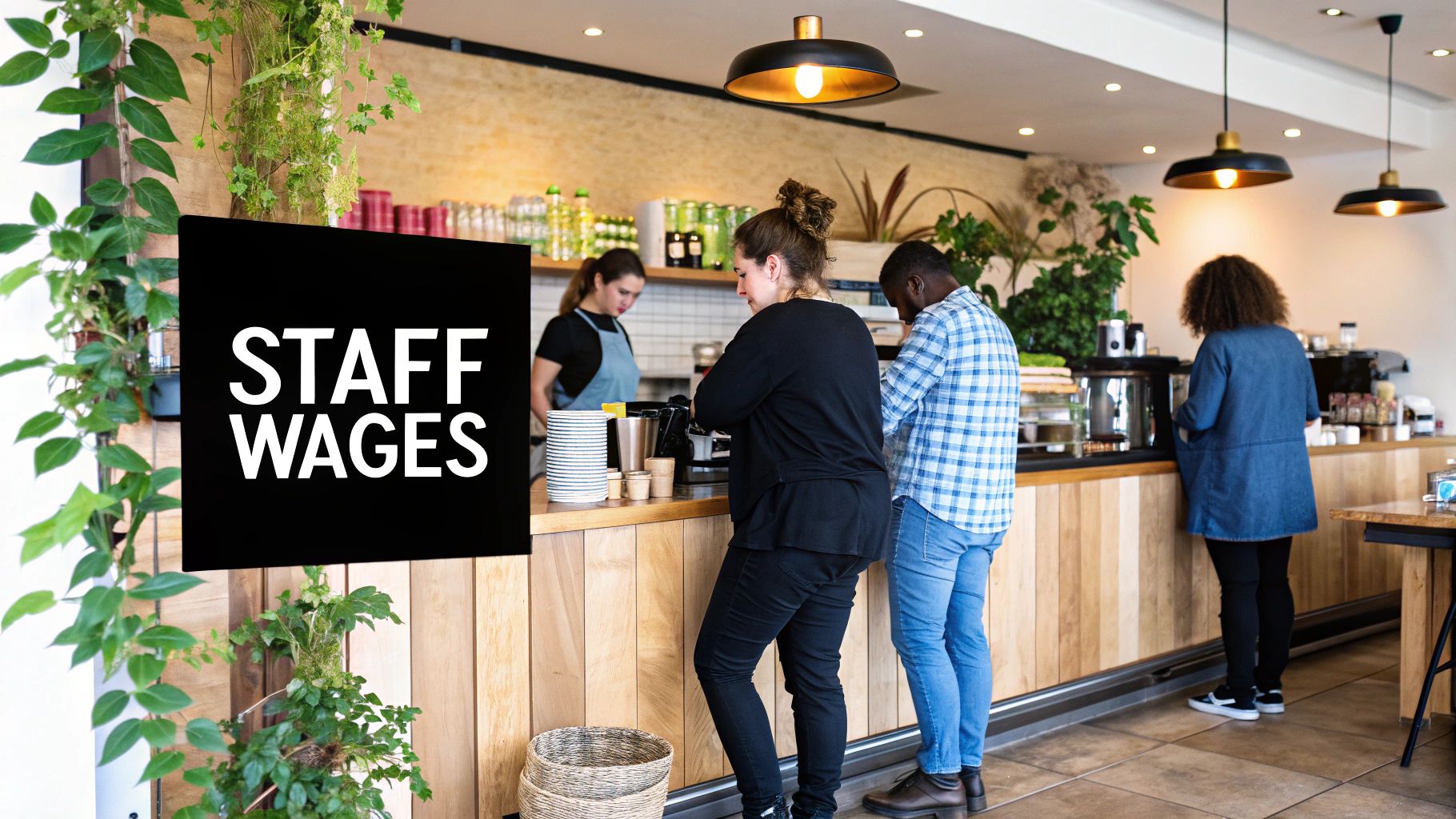
Think about it: your baristas are the face of your brand. They’re the first hello and the last goodbye for most customers. Their skill, passion, and personality will define your café's reputation. Cutting corners here is a false economy that can hobble your business before you've even pulled your first shot.
The Real Cost of a Great Team
Hiring staff in the UK is about more than just their hourly wage. You need a proper budget that covers all the associated costs to stay compliant and attract the best talent.
Here’s what you need to account for:
- Wages: You must pay at least the National Living Wage, which changes each year. But in the speciality coffee scene, attracting skilled baristas means offering a more competitive rate—something closer to £11-£14 per hour, depending on their experience and your location.
- National Insurance Contributions: As an employer, you'll be paying Class 1 National Insurance on your employees' earnings. Don't forget to factor this significant chunk into your wage bill.
- Pension Contributions: Auto-enrolment rules mean you are legally required to contribute to your team's workplace pensions. It's not optional.
- Training: A great barista knows more than just how to push a button. They understand extraction, milk texturing, and, most importantly, customer service. Set aside a budget for initial training—professional courses can run £200-£500 per person—plus ongoing development to keep their skills sharp.
For a small team—say, one full-time manager and two part-time baristas—your monthly payroll costs could easily land somewhere between £4,000 and £6,500 once you add everything up.
Crafting Your Launch Marketing Budget
Once your team is ready to go, you need to make sure there's a queue of eager customers waiting at the door. That takes a smart, targeted marketing launch.
Let’s be honest, the UK coffee market is packed. It's a highly competitive space, especially for independents. For a new speciality café to cut through, you have to make a memorable first impression.
A solid launch marketing budget is how you cut through that noise. Plan to set aside around £2,000 to £6,000 for your initial push. The focus should be on activities that create local buzz and build your online presence before you even open.
Your launch isn’t just about having a busy first week. It’s about building a foundation of loyal customers who will become your biggest cheerleaders. Your marketing needs to feel authentic and connect with your local community.
Here's where that budget should go:
- Website & Social Media: Get a professional-looking website up with your menu, story, and location (£500-£1,500). In the weeks before you launch, run targeted social media ads on Instagram and Facebook to reach coffee lovers in your area.
- Local PR & Influencers: Reach out to local food bloggers and community groups. A 'soft launch' event just for them can create a wave of positive chatter right before you officially open.
- Launch Event: Host a grand opening! Think special offers, live music, or free coffee samples to create a memorable experience and pull people in off the street.
- Signage & Print: Don’t underestimate good old-fashioned marketing. Invest in high-quality exterior signage and some well-designed flyers or loyalty cards to hand out locally.
Once everything is in place, you can explore some proven marketing strategies for new businesses to bring in those crucial first customers. This strategic spending ensures that when your perfectly trained team is ready to serve, you have an audience ready to be wowed.
Your Cafe Startup Questions Answered
When you're digging into the numbers for a new speciality coffee shop, a lot of questions pop up. It’s completely normal. After breaking down all the big costs, from finding a location to your grand opening, it's time to tackle the most common queries we hear from aspiring café owners across the UK.
Here are some straightforward, practical answers to help you finalise that business plan with real confidence.
How Much Working Capital Should I Have Beyond Startup Costs?
This is, without a doubt, one of the most important questions you can ask. A solid rule of thumb is to have at least three to six months of operating expenses tucked away as working capital. This is the cash reserve you'll rely on before your café starts turning a profit, covering the essentials like rent, staff wages, utilities, and stock.
For a typical independent UK café, this could mean having an extra £15,000 to £40,000 in the bank after every single setup cost has been paid. Think of it as your business’s immune system—it’s there to help you navigate the unpredictable first few months and handle any curveballs without derailing the dream.
What Are the Best Ways to Reduce Initial Cafe Startup Costs?
Bringing down that initial investment without cutting corners on quality is a smart play. One of the single best strategies is to lease your high-ticket items, like the espresso machine and grinders, instead of buying them outright. It’s a move that dramatically frees up your upfront cash.
You can also find some serious savings by:
- Sourcing second-hand: Look for quality, refurbished furniture and back-of-house kit from reputable UK suppliers. You’d be surprised what you can find.
- Choosing your site wisely: A spot that was previously a café or restaurant is a goldmine. It will likely have the core plumbing and electrical infrastructure already in place, saving you thousands on fit-out costs.
- Phasing your launch: You don't have to do everything at once. Think about opening with a simpler, more focused menu and a smaller team. You can always expand your offering as you build a steady customer base and get a real feel for what they love.
How Long Does It Take for a New Cafe to Become Profitable?
Honestly, this can vary massively depending on your location, your concept, and how tightly you manage your finances. That said, most independent cafés in the UK aim to break even within the first 6 to 12 months and start seeing real profit within 18 to 24 months.
The first year is often a marathon, not a sprint. It's about building a loyal community, refining your operations, and establishing your reputation for incredible coffee and service.
Solid financial control, smart local marketing, and—most importantly—a consistently brilliant product are what will get you to profitability faster. It takes patience, but the reward of a thriving, self-sustaining business is worth every bit of the effort.
At Ue Coffee Roasters, we've spent over a decade helping cafés build successful businesses from the ground up. From sourcing world-class speciality beans to providing professional equipment and barista training, we're here to be your partner on this exciting journey. Explore our wholesale coffee solutions at https://www.uecoffeeroasters.com.
